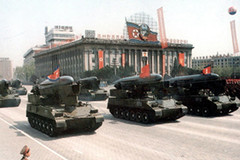
The western imperialist countries have accused the Democratic People's Republic of Korea (DPRK) of using satellite technology for nuclear weapons research.
Originally uploaded by Pan-African News Wire File Photos
Tim Johnson | McClatchy Newspapers
last updated: March 09, 2009 12:48:01 PM
BEIJING — North Korea on Monday put its armed forces on standby, severed a military hot line with South Korea and warned that any attempt by the United States to shoot down a rocket launch would trigger an immediate war.
The escalation in tensions coincided with the onset of joint U.S.-South Korean war games, which brought a U.S. nuclear-powered aircraft carrier off the Korean Peninsula.
Scores of South Koreans were stranded at the Kaesong industrial complex several miles inside North Korea, where dozens of companies from South Korea have set up factories.
Pyongyang appeared to be moving ahead with plans to send what it claims is a communications satellite into orbit. U.S. and Japanese officials charge that the launch is a cover for a test of North Korea's
latest-generation ballistic missile, potentially powerful enough to hit
Alaska, and that their own antimissile batteries may try to shoot it down.
"Shooting our satellite for peaceful purposes will precisely mean a
war," said a statement in the name of Pyongyang's general staff of the military, carried by the official Korean Central News Agency.
Pyongyang said it had put its armed forces on "full combat readiness," and it vowed immediate retaliation for any strike.
Apparently to clear the skies before the expected launch, North Korea said last week that it couldn't ensure the safety of commercial
jetliners within its airspace.
The senior Obama administration envoy for the North Korean nuclear crisis, Stephen Bosworth, warned Pyongyang that firing a ballistic missile would violate a U.N. Security Council resolution adopted after a previous test of a Taepodong-2 missile in 2006. Later that year, North Korea tested a nuclear device.
"Whether they describe it as a satellite launch or something else makes no difference. This would be a violation of the U.N. Security Council Resolution 1718," Bosworth said in Seoul, South Korea, where he was visiting, according to the semiofficial Yonhap news agency.
Neighboring China, which hosts long-standing disarmament talks that include the Koreas, the United States, Japan and Russia, has said that it's aware that North Korea plans a launch, but it's declined to characterize it as an act that would defy the U.N. resolution.
Unification Ministry spokesman Kim Ho-nyou said in Seoul that 621 South Koreans were at the Kaesong industrial complex or elsewhere in North Korea, and that 80 of them who were scheduled to return to South Korea on Monday were unable to do so, Yonhap said. The complex was built earlier in the decade when South Korea sought to defang North Korea through major investment schemes.
Some 25,000 U.S. military personnel and an undetermined number of South Korean soldiers are taking part in the war games, which have occurred annually and are scheduled to last through March 20 this time.
"It's purely a defensive exercise," said Dave Palmer, a spokesman in
Seoul for U.S. Forces Korea.
Pyongyang charged that the war games were aimed at launching a "second Korean war."
Kim Jong Il, the North Korean leader, is widely thought to have suffered a stroke last August, and a possible succession drama in the Stalinist state has drawn international attention.
North Koreans went to the polls Sunday to vote on the country's
parliament, and Kim won re-election to a seat with 100 percent support, North Korea's official news agency said.
Late Monday, North Korea released the names of all 687 lawmakers who'd been elected to the body, and the names didn't include Kim's
Swiss-educated youngest son, Kim Jong Un, 26, who some analysts said was a likely successor. Once again, signs are murky over who may be the heir apparent to North Korea's 67-year-old ruler.
No comments:
Post a Comment